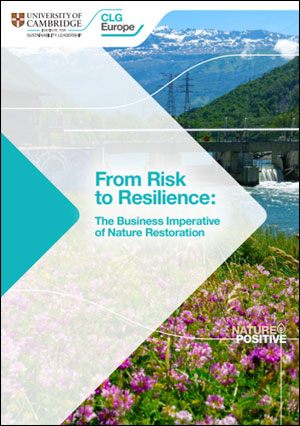19 September 2023 - A new CLG Europe’s briefing explores the urgent mission to restore Europe's ailing natural habitats and intricately examines the pivotal involvement of Corporations and Businesses, shedding light on the proposed EU Nature Restoration Law. Through illuminating case studies, it uncovers the dual benefits of nature restoration for both biodiversity and enterprises.
Access the business briefing here
About the business briefing
This briefing addresses the restoration of Europe's deteriorating natural habitats, where over 80% currently languish in poor conditions. Businesses play a pivotal role in halting this crisis, as evidenced by the proposed EU Nature Restoration Law. This briefing showcases the compelling economic and social benefits that such a law can provide. While nature is indispensable for societies and economies through vital services like food production and climate regulation, the 2020 'State of Nature in the EU' report reveals a distressing 81% of habitats in decline. Climate change and pollution compound the issue. The accelerating worldwide decline of nature threatens economies and well-being. Approximately 55% of global GDP ($58 trillion) relies on natural resources and services. This fragility necessitates swift action against biodiversity loss. Beyond conservation, nature restoration offers immediate benefits to biodiversity and a host of societal and economic advantages outlined here. A robust EU Nature Restoration Law can be the linchpin for successful collaboration between businesses and ecosystems, driving shared benefits. Real-world success stories (see Business case studies) from the Corporate Leaders Group Europe emphasize the symbiotic relationship between biodiversity and business prosperity. These examples underscore the potential of sustainable practices for positive outcomes. In securing a sustainable future, prioritizing ecosystem restoration and protection is paramount. This briefing's message is clear: by regenerating nature, we can ensure lasting well-being for both our economies and our planet.
Key recommendations
- Businesses should commit to ambitious nature action, that includes nature restoration as part of a wider nature, climate and sustainability strategy. Within this strategy, assessing nature related risks will help contribute to businesses’ future resilience.
- The business sector can play a significant role in shaping the National Restoration Plans set by governments by engaging in the planning process. The plans will create employment and income opportunities for ecosystem managers and local communities as well as for restoration and remediation businesses. Companies should get actively involved in the process, for example by bringing their expertise in nature restoration into the planning of restoration measures that are compatible with socio-economic goals.
- Businesses should engage with local and regional stakeholders to increase public support and reputation. This should ideally have long-term impacts and should not be limited to a single project. Engaging civil society and academia will also enable businesses to use local knowledge as well as increase the company’s reputation. Businesses should strive for broad collaboration efforts whenever possible, developing local plans for both business and nature restoration in the regions where they are active.
- The proposed EU law creates an enabling policy framework for nature restoration in which businesses can engage – the EU should adopt ambitious targets for restoration of all ecosystems. This will enable the business sector to operate in a predictable legal environment with guaranteed legal ‘hooks’.
- The stable and predictable legal environment will in turn create opportunities for access to funding and investment – businesses have a key role to play as a mix of financial sources is needed to ensure restoration at scale. According to the legal proposal, the EU must ensure that EU funding is available for nature restoration, supported by the allocation of resources at the national level. Companies can engage in public–private partnerships and explore blended finance opportunities.
Citing this report:
University of Cambridge Institute for Sustainability Leadership (CISL). (2023). From Risk to Resilience: The Business Imperative of Nature Restoration. Cambridge, UK: University of Cambridge Institute for Sustainability Leadership..






